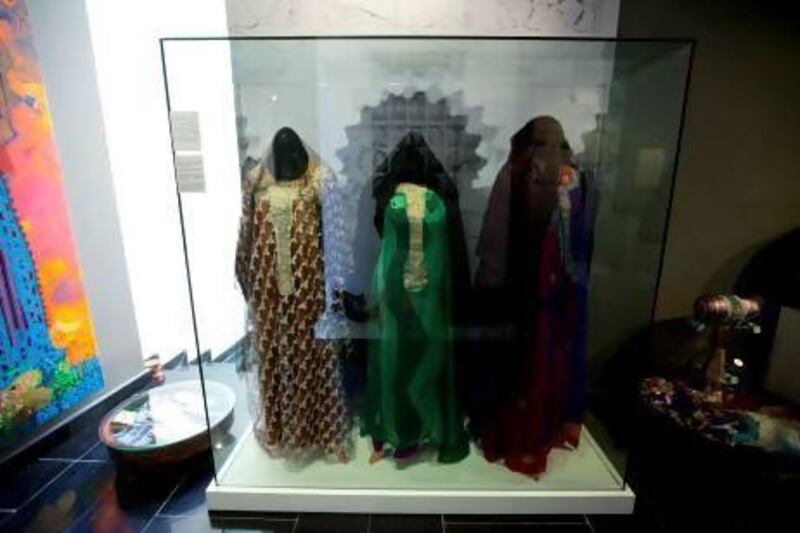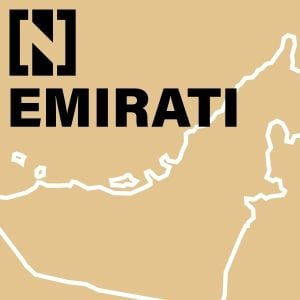In 1819, Emirati women fought alongside their men, defending Ras Al Khaimah against an invasion by British forces from the sea.
In 1956, a time when Arab nationalism and resistance was at a peak, Emirati women joined in with their voices on radio and in newspapers, turning their majlises into a forum for political discussions.
And when the Tripartite Aggression - known in the West as the Suez Crisis - led to military confrontation between Egypt on one side and Britain, France and Israel on the other, it was the women of the Emirates who directly lobbied the Egyptian president, Gamal Abdel Nasser, expressing their support for his cause.
Then in 1971, on the eve of the formation of the nation and withdrawal of British protection, Iranian forces occupied the three islands of Abu Mousa and the Greater and Lesser Tunbs. For Emirati high-school girls it was their first taste of political action, joining hundreds of others in spontaneous demonstrations against the occupation.
In 1978, female students at UAE University staged a protest against the Camp David agreement between Egypt and Israel, which later led to the 1979 Egypt-Israel Peace Treaty.
These are just some of the ways Emirati women have shown political participation, an area of history often neglected or even unknown to most citizens and residents.
Inside the newly opened Women's Museum in Dubai, which is dedicated to everything related to Emirati women, visitors will find a full wall accompanied by rare photos and documents given over to the political roles of Emirati women of the past and the present.
"I want visitors who come to the museum to feel that Emirati women were not, and are not, an isolated community. They are part of the community and active contributors," says Dr Rafia Obaid Ghubash, the founder of the Women's Museum, which opened this month.
A writer, professor and consultant psychiatrist, Dr Ghubash has spent millions of dirhams and five years working on bringing her vision to life, with the past three years spent overseeing the construction process and gathering rareitems and photos. These include rows of different-shaped face burqas, designs of traditional wear and their accessories, house and kitchen utensils, a variety of perfumes and beauty secrets, and artistic expressions through words or art. All of this and more bring women's private lives into the public light.
The three-storey building housing the museum is tucked away in an alley near Deira's bustling Gold Souq, marked as "Sikka 28", behind the RAK bank.
Refusing to set it up in the touristic Bastakiya site in Bur Dubai, Dr Ghubash picked a location close to her heart. "I was born and raised in this neighbourhood but now no one remembers this place. It is just a busy souq," she says. "The old souls of Dubai are here and they are searching for people to come back here and reconnect with them."
To honour the location, she set up the "memory of the place", where old photos from personal albums have pride of place on the entrance wall. Two black-and-white portraits show Dr Ghubash as a young girl with a fringe. In one she is smiling at the camera, in the other she is standing next to her sister, holding a pair of sunglasses.
"You might recognise some faces and may not recognise others," she says. "But it will make you pause and try to find the story behind the photos, or make your own story."
One of a kind in the region, every corner of the museum tells a story, and almost each item can be traced back to its owner and her subsequent story.
"Here is our Barbie," Dr Ghubash says, pointing to a faceless fabric doll, known as Al Haya, dressed in a traditional Emirati dress.
Captured through a series of passports is the evolution of a woman's role. Inside a 1956 British passport - which were issued to prominent Emirati families before independence - Dr Ghubash's mother was described as a "housewife" under profession. Inside a 1964 "Dubai and its dependencies" passport, she was a "landlord".
"Emirati women have been active in every possible role," Dr Ghubash says. "From their economic roles in setting up businesses and participating in real estate and land sales from as early as the 1950s, to social and humanitarian roles, as well as their important political role in raising the leaders of the country. It is endless. They are involved in every aspect of life."
Rare documents reflect just how important women have been in the formation and perseverance of the nation as far back as the early 1800s.
In an article published in Kuwait in 1951, titled Tabeen Amir - which translates to Funeral Oration of a Prince - the writer,Abdulla Al Sanea, praises Sheikha Meera bint Mohammed Al Suweidi, wife of the then ruler of Sharjah, Sheikh Sultan bin Saqr Al Qasimi, for supporting her husband during his illness. Sheikha Meera assumed responsibility over Sharjah in her husband's absence for medical treatment.
British records from 1953 and 1966 document the critical political role played by Sheikha Salama bint Butti, the mother of the late President Sheikh Zayed, and the "most influential women on the Trucial Coast" in ensuring the security and stability of Abu Dhabi. A rare colour photo of Sheikha Salama and Sheikh Zayed is displayed near her biography on the wall.
Another wall is dedicated to the stories and contributions of the wives, daughters and mothers of rulers of the UAE, such as Sheikha Hessa bint Al Murr, the mother of the late ruler of Dubai, Sheikh Rashid bin Saeed Al Maktoum (1958-1990), and wife of a former Ruler of Dubai, Sheikh Saeed Al Maktoum (1912-1958).
The wall tells how she took an active role in the business community and used her influence to minimise foreign interference in Dubai's internal affairs.
Sheikha Salama bint Zayed, daughter of the ruler of Abu Dhabi between 1855-1909, was known for her wisdom and strong personality, to the extent that her father, Sheikh Zayed the First, and subsequent rulers sought her counsel before making major decisions.
Details on the life and achievements of Sheikha Fatima bint Mubarak, the wife of the late Sheikh Zayed, and Sheikha Latifa bint Hamdan Al Nahyan, the wife of the former Ruler of Dubai, Sheikh Rashid, and mother of the current Ruler of Dubai, the Vice President and Prime Minister of the UAE, Sheikh Mohammed bin Rashid, are among the highlighted dignitaries.
Pioneering private citizens have their own section in the museum. There is Ousha bint Hussain Lootah (1932-1992), one of the first women to open a bank account and a private mailbox.
Throughout the museum are Dr Ghubash's personal touches, such as the aromas of coffee and incense as you enter, to reflect how visitors are welcomed into Arab homes.
A perfume and gift shop is named after the folkloric and mythical character of Um Al Duwais. There are several versions of the story and several descriptions of her appearance, but all end the same way with Um Al Duwais using a sickle to kill and mutilate the men she seduces.
The version Dr Ghubash relates is that Um Al Duwais was the daughter of a prominent family who fell in love with a simple palm tree farmer. Her family killed him by cutting him into pieces with a sickle, so out of revenge, Um Al Duwais mixed a special perfume that attracted and seduced men. After they followed her, she cut them up with a sickle.
"So I named my perfume shop after her," Dr Ghubash says with a smile.
There is an entire floor dedicated to the poet Ousha bint Khalifa Al Suwaidi, known as Fatat Al Arab, the "Girl of Arabs". Her nod of approval helped launch the poetic career of one of the most influential men in the country: Sheikh Mohammed bin Rashid.
"The new generation doesn't know much about their past," says Dr Ghubash. "This museum will help them reconnect with their past and feel proud of just how much an Emirati woman has done."
The museum is open from Saturday to Thursday from 9am to 8pm and entrance costs Dh20. For more information, call 04 234 2342 or visit www.womenmuseumuae.com/index_e.html






